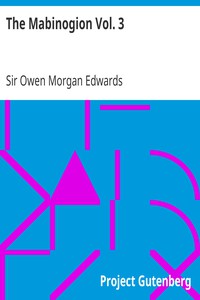The Mabinogion Vol. 3 by Sir Owen Morgan Edwards and Lady Charlotte Schreiber (ereader for textbooks TXT) 📗

Book online «The Mabinogion Vol. 3 by Sir Owen Morgan Edwards and Lady Charlotte Schreiber (ereader for textbooks TXT) 📗». Author Sir Owen Morgan Edwards and Lady Charlotte Schreiber
And the next morning they paid Matholwch the horses as long as the trained horses lasted. And then they journeyed into another commot, where they paid him with colts until the whole had been paid, and from thenceforth that commot was called Talebolion.
And a second night sat they together. “My lord,” said Matholwch, “whence hadst thou the cauldron which thou hast given me?” “I had it of a man who had been in thy land,” said he, “and I would not give it except to one from there.” [45] “Who was it?” asked he. “Llassar Llaesgyvnewid; he came here from Ireland, with Kymideu Kymeinvoll, his wife, who escaped from the Iron House in Ireland, when it was made red hot around them, and fled hither. And it is a marvel to me that thou shouldst know nothing concerning the matter.” “Something I do know,” said he, “and as much as I know I will tell thee. One day I was hunting in Ireland, and I came to the mound at the head of the lake, which is called the Lake of the Cauldron. And I beheld a huge yellow-haired man coming from the lake with a cauldron upon his back. And he was a man of vast p. 46size, and of horrid aspect, and a woman followed after him. And if the man was tall, twice as large as he was the woman, and they came towards me and greeted me. ‘Verily,’ asked I, ‘wherefore are you journeying?’ ‘Behold this,’ said he to me, ‘is the cause that we journey. At the end of a month and a fortnight this woman will have a son; and the child that will be born at the end of the month and the fortnight will be a warrior fully armed.’ So I took them with me, and maintained them. And they were with me for a year. And that year I had them with me not grudgingly. But thenceforth was there murmuring, because that they were with me. For from the beginning of the fourth month they had p. 47begun to make themselves hated and to be disorderly in the land; committing outrages, and molesting and harassing the nobles and ladies; and thenceforward my people rose up and besought me to part with them, and they bade me to choose between them and my dominions. And I applied to the council of my country to know what should be done concerning them; for of their own free will they would not go, neither could they be compelled against their will, through fighting. And [the people of the country,] being in this strait, they caused a chamber to be made all of iron. Now when the chamber was ready, there came there every smith that was in Ireland, and every one who owned tongs and hammer. And they caused coals to be piled up as high as the top of the chamber. And they had the man, and the woman, and the children, served with plenty of meat and drink; but when it was known that they were drunk, they began to put fire to the coals about the chamber, and they blew it with bellows until the house was red hot all around them. Then was there a council held in the centre of the floor of the chamber. And the man tarried until the plates of iron were all of a white heat; and then, by reason of the great heat, the man dashed against the plates with his shoulder and struck them out, and his wife followed him; but except him and his wife none escaped thence. And then I suppose, lord,” said Matholwch unto Bendigeid Vran, “that he came over unto thee.” “Doubtless he came here,” said he, “and gave unto me the cauldron.” “In what manner didst thou receive them?” “I dispersed them through every part of my dominions, and they have become numerous and are prospering everywhere, and they fortify the places p. 48where they are with men and arms, of the best that were ever seen.”
That night they continued to discourse as much as they would, and had minstrelsy and carousing, and when it was more pleasant to them to sleep than to sit longer, they went to rest. And thus was the banquet carried on with joyousness; and when it was finished, Matholwch journeyed towards Ireland, and Branwen with him, and they went from Aber Menei, with thirteen ships and came to Ireland. And in Ireland was there great joy because of their coming. And not one great man or noble lady visited Branwen unto whom she gave not either a clasp, or a ring, or a royal jewel to keep, such as it was honourable to be seen departing with. And in these things she spent that year in much renown, and she passed her time pleasant, enjoying honour and friendship. And in the meanwhile, it chanced that she became pregnant, and in due time a son was born unto her, and the name that they gave him was Gwern the son of Matholwch, and they put the boy out to be foster-nursed, in a place where were the best men of Ireland.
And behold in the second year a tumult arose in Ireland, on account of the insult which Matholwch had received in Wales, and the payment made him for his horses. And his foster-brothers, and such as were nearest unto him, blamed him openly [48a] for that matter. And he might have no peace by reason of the tumult until they should revenge upon him this disgrace. And the vengeance which they took was to drive away Branwen from the same chamber with him, and to make her cook [48b] for the court; and they p. 49caused the butcher, after he had cut up the meat, to come to her and give her every day a blow on the ear, and such they made her punishment.
“Verily, lord,” said his men to Matholwch, “forbid now the ships and the ferry boats and the coracles, that they go not into Wales, and such as come over from Wales hither, imprison them that they go not back for this thing to be known there.” And they did so; and it was thus for no less than three years.
And Branwen reared a starling in the cover of the kneading trough, and she taught it to speak, and she taught the bird what manner of man her brother was. And she wrote a letter of her woes, and the despite with which she was treated, and she bound the letter to the root of the bird’s wing, and sent it towards Wales. And the bird came to this Island, and one day it found Bendigeid Vran at Caer Seiont in Arvon, conferring there, and it alighted upon his shoulder and ruffled its feathers, so that the p. 50letter was seen, and they knew that the bird had been reared in a domestic manner.
Then Bendigeid Vran took the letter and looked upon it. And when he had read the letter, he grieved exceedingly at the tidings of Branwen’s woes. And immediately he began sending messengers to summon the Island together. And he caused seven score and four countries to come unto him, and he complained to them himself of the grief that his sister endured. So they took counsel. And in the counsel they resolved to go to Ireland, and to leave seven men as princes here. And Caradawc the son of Bran, as the chief of them, and their seven knights. In Edeyrnion, were these men left. And for this reason were the seven knights placed in the town. [50a] Now the names of these seven were Caradawc the son of Bran, and Heveydd Hir, and Unic Glew Ysgwyd, and Iddic the son of Anarawc Gwalltgrwn, and Fodor the son of Ervyll, and Gwlch Minascwrn, and Llassar the son of Llaesar Llaesgygwyd, and Pendaran Dyved as a young page with them. And these abode as seven ministers to take charge of this Island; and Caradawc the son of Bran was the chief amongst them.
Bendigeid Vran, with the hosts of which we spoke, sailed towards Ireland, and it was not far across the sea, and he came to shoal water. It was but by two rivers; the Lli and the Archan were they called; and the nations covered the sea. [50b] Then he proceeded with what provisions he had on his own back, and approached the shore of Ireland.
p. 51Now the swineherds of Matholwch were upon the sea shore, and they came to Matholwch. “Lord,” said they, “greeting be unto thee.” “Heaven protect you,” said he, “have you any news?” “Lord,” said they, “we have marvellous news; a wood have we seen upon the sea, in a place where we never yet saw a single tree.” “This is indeed a marvel,” said he; “saw you aught else?” “We saw, lord,” said they, “a vast mountain beside the wood, which moved, and there was a lofty ridge on the top of the mountain, and a lake on each side of the ridge. And the wood, and the mountain, and all these things moved.” “Verily,” said he, “there is none who can know aught concerning this, unless it be Branwen.”
Messengers then went unto Branwen. “Lady,” said they, “What thinkest thou that this is?” “The men of the Island of the Mighty, who have come hither on hearing of my ill treatment and my woes.” “What is the forest that is seen upon the sea?” asked they. “The yards and the masts of ships,” she answered. “Alas,” said they, “what is the mountain that is seen by the side of the ships?” “Bendigeid Vran, my brother,” she replied, “coming to shoal water; there is no ship that can contain him in it.” “What is the lofty ridge with the lake on each side thereof?” “On looking towards this Island he is wroth, and his two eyes on each side of his nose are the two lakes on each side of the ridge.”
The warriors and chief men of Ireland were brought together in haste, and they took counsel. “Lord,” said the nobles unto Matholwch, “there is no other counsel than to retreat over the Linon, p. 52(a river which is [52a] in Ireland,) and to keep the river between thee and him, and to break down the bridge that is across the river, for there is a load-stone at the bottom of the river that neither ship nor vessel can pass over.” So they retreated across the river, and broke down the bridge.
Bendigeid Vran came to land, and the fleet with him by the bank of the river. “Lord,” said his chieftains, “knowest thou the nature of this river, that nothing can go across it, and there is no bridge over it?” “What,” said they, “is thy counsel concerning a bridge?” “There is none,” said he, “except that he who will be chief let him be a bridge. I will be so,” said he.





Comments (0)